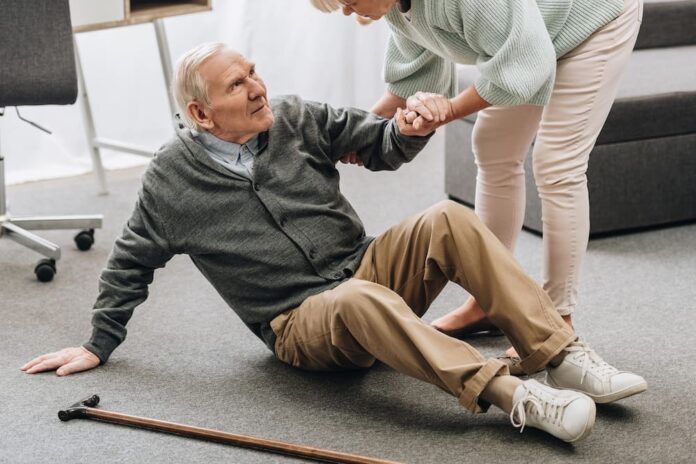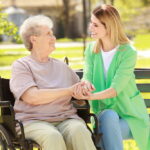As our parents age, their physical abilities and balance may decline, making them more prone to falls. While occasional trips or slips are common, frequent falls can indicate underlying health issues or hazards in their environment. Understanding how to address and prevent falls can significantly improve their safety and quality of life.
Common Causes of Falls in the Elderly
To effectively mitigate the risk of falls, it’s important to understand common contributing factors:
– Muscle Weakness: Age-related muscle atrophy can make it difficult for older people to maintain their balance.
– Medications: Certain medications can cause dizziness or drowsiness.
– Vision Problems: Poor eyesight can result in tripping over unseen objects.
– Chronic Conditions: Conditions such as arthritis, diabetes, and Parkinson’s disease can impair balance and coordination.
– Environmental Hazards: Clutter, uneven flooring, poor lighting, and loose rugs can cause trips and falls.
Assessing Your Parent’s Fall Risk
Before implementing any preventive measures, it’s essential to assess the specific risks your parent might face:
Physical Assessments
– Medical Checkup: Schedule a visit to their healthcare provider to evaluate their overall health, review medications, and address any chronic conditions.
– Vision and Hearing Tests: Regular checkups can help catch any deteriorating senses that might contribute to falls.
– Balance and Gait Evaluation: A physical therapist can assess their walking pattern and recommend exercises to improve their stability.
Environmental Assessments
– Home Safety Evaluation: Go through their home to identify and correct potential hazards. This might include removing clutter, securing loose carpets, and ensuring adequate lighting.
Preventive Measures and Solutions
After identifying the risks, the next step is to implement preventive measures:
Physical Aids and Modifications
– Mobility Aids: Equip your parent with walkers, canes, or other mobility aids to provide additional support.
– Home Modifications: Install grab bars in bathrooms, handrails on stairs, and non-slip mats in potentially wet areas.
– Wear Proper Footwear: Shoes should have non-slip soles and provide adequate support.
Exercise and Rehabilitation
Regular physical activity can significantly reduce the risk of falls by improving strength, balance, and coordination:
– Strengthening Exercises: Encourage your parent to perform exercises that target muscles used for balance.
– Balance Training: Activities like Tai Chi or specific balance exercises can enhance steadiness.
– Physical Therapy: A physical therapist can develop a tailored exercise program and monitor progress.
What to Do When Your Elderly Parents Keep Falling
If falls continue despite preventive measures, it can be a distressing and challenging situation. Understanding what to do when your elderly parents keep falling can include several important steps:
– Medical Reevaluation: Return to their healthcare provider to reassess their health. There might be new underlying issues that need addressing.
– Adjustments to Medication: Review all medications with a doctor to identify any that might contribute to dizziness or balance issues.
– Professional Care: In some cases, hiring professional caregivers or seeking assisted living options might be necessary to ensure their safety.
Tips for Caregivers
Caring for elderly parents can be demanding. Here are some practical tips:
– Communicate Openly: Discuss their fears and preferences regarding falls and safety measures.
– Stay Informed: Keep up to date with best practices for fall prevention and caregiving.
– Support Networks: Engage with local caregiving groups for emotional and practical support.
Conclusion
Ensuring the safety of our aging parents is a priority, especially when it comes to preventing falls. By understanding the common causes, assessing risks, and implementing effective preventive measures, we can help our parents maintain their independence and well-being. While dealing with frequent falls can be challenging, consistent effort and proper planning can make a significant difference.
Did you find this helpful? Check out our other helpful articles on our website.
Read Also
- Modern Approaches to Adolescent Mental Health Treatment for Lasting RecoveryWith increasing numbers of teens experiencing emotional and behavioral health concerns, adolescent mental health treatment has become more essential than ever. Conditions such as anxiety, depression, trauma and mood instability are on the rise, and effective support must evolve with these growing needs. Today’s treatment models blend evidence-based therapy with flexible access and holistic care, giving… Read more: Modern Approaches to Adolescent Mental Health Treatment for Lasting Recovery
- How to Find a 5-Star Dentist Near YouChoosing a dentist is more than just finding someone who can clean your teeth. It’s about selecting a trusted partner in your long-term oral health. A 5-star dentist not only provides excellent clinical care but also delivers a positive patient experience, from the moment you walk in until the moment you leave. Whether you’re new… Read more: How to Find a 5-Star Dentist Near You
- Your Easy-Peasy Guide to Brewing Amazing MatchaHey there! So, you’ve heard all the buzz about matcha – that vibrant green powder that’s not just pretty but packed with good stuff? It can seem a little fancy and intimidating at first, but trust me, making a delicious cup at home is simpler than you think. Forget complicated ceremonies for now; let’s just… Read more: Your Easy-Peasy Guide to Brewing Amazing Matcha
- Embracing Holistic Wellness: Insights from a Lansing, MI Health CenterReframing Health: Moving Beyond Symptom Management Treating only symptoms often offers quick relief, yet long-term results stay out of reach. When care zeroes in on isolated complaints, the bigger picture, such as stress, behavior, or lifestyle, often gets missed. Research shows that whole-person care, which looks at physical, emotional, and environmental factors, yields better outcomes… Read more: Embracing Holistic Wellness: Insights from a Lansing, MI Health Center
- VO₂ Max Testing Explained: What It Is & Why It Matters for Your HealthVO₂ max sounds like a term reserved for elite athletes, but it’s among the most accurate measures of your lifetime and general condition. Moreover, it goes beyond performance. Monitoring your VO₂ max will help you to ascertain your body’s capacity to control stress, its oxygen consumption efficiency, and your internal ageing process. If you have… Read more: VO₂ Max Testing Explained: What It Is & Why It Matters for Your Health
- So, what exactly is matcha?Think of matcha as green tea turned up to eleven! Instead of steeping leaves and tossing them out, matcha is made by grinding whole green tea leaves into this super-fine, vibrant green powder. You whisk it right into hot water (or milk!), meaning you’re drinking the entire leaf. That’s why folks say you get way… Read more: So, what exactly is matcha?
- How to Tell When It’s Time for Professional Senior Care SupportCaring for an aging loved one is a journey filled with love, patience, and difficult decisions. One of the toughest choices families face is knowing when it’s time to seek extra help. In this article, trusted Los Angeles caregivers for seniors explore the signs that it might be time to bring in professional support, not… Read more: How to Tell When It’s Time for Professional Senior Care Support
- Reporting a Work Injury: What Deadlines You Need to KnowAfter a workplace injury, time isn’t always on your side. Many employees aren’t aware that there are strict deadlines for reporting a work-related injury, and missing that window can put your entire claim at risk. Whether your injury was sudden or developed gradually over time, it’s essential to act quickly and follow the proper steps.… Read more: Reporting a Work Injury: What Deadlines You Need to Know









